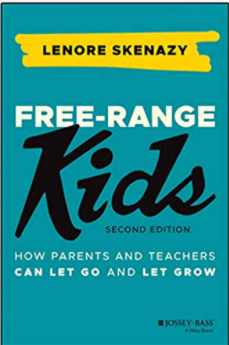






How to Fight the Anxiety that Makes You Want to Hover
Did you know that January is Mental Wellness Awareness Month! Woo hoo! How can you celebrate?
Get mentally well!
That can be a challenge, especially in an era that can seem hellbent on creating new things to worry about. So here’s something that may help. Let Grow President Lenore Skenazy sat down with Tampa talk show host Maggie Rodriguez for a chat about the second edition of Free-Range Kids: How Parents and Teachers Can Let Go and Let Grow. Here’s a bit of that conversation that can help parents put fear in perspective:
Maggie Rodriguez: Why do you think so many of us parents have a hard time raising kids that way these days?
Lenore Skenazy: It is being alive in America, in a culture that has become obsessed with seeing almost the downside of everything. But in particular, seeing any far-fetched danger that can be conjured up in almost any situation, especially when it comes to kids. You’re almost considered abnormal if you don’t go to the very darkest place first. I call it “worst first thinking” — coming up with the worst-case scenario first, and then proceeding as if it’s likely to happen. This is a cultural tic that, if you looked at any book or any movie from 100 years ago, you would not see happening. It’s a recent way of looking at childhood, and it feels normal, but it’s not normal.
M.R. I think we do it because we feel we’ve evolved. We think we’re protecting our kids more now.
L.S. We are protecting our children more now, but we’re protecting them from events that were extremely unlikely to happen. If you drive your kid to the bus stop every day, you can say, “See? My child was never kidnapped!” And you might think it’s because you drove your child to the bus stop every day and waited with the kid in the car, in the air conditioning, on their iPad, not talking to the other children, not dealing with a gnat or a dog or a bee, that they’ve been safe. And there’s no way for me to say, “Yeah, but there’s a 99.999% chance they also would’ve been safe if they had walked there. And they might have met a neighbor who goes a little earlier. They might have developed a real fondness for the local squirrel and started feeding him nuts. They might have become interested in trees.” There’s an upside to independence and a downside to excess protection that are invisible — until you make the leap.
M.R. Each title of your book is sort of an instruction for parents, a how to. Chapter One is “Know When to Worry.” How do you do that?
L.S. One of the things that helps is if you actually list the things you’re worried about. Okay, if you’re terrified that your 10-year-old is at an ice cream parlor with another 10-year-old without a parent, but in a safe place, in a safe neighborhood, with all these other customers around, tell me what you’re worried about.
Are you worried that she will eat the wrong food and therefore get fat? Are you worried that she’s going to go to the bathroom and get attacked? Are you worried that she’s going to suddenly decide to run out into the street and get run over by a truck? Are you worried that someone is going to make an inappropriate remark and she’s going to be so shocked and traumatized that she’ll never emotionally recover?
Once you start literally writing these things down, I hope they seem vanishingly rare, to the point of almost silly to worry about.
M.R. But that requires all of us parents, as you say in Chapter Ten, to “Get Braver.”
L.S. To get braver requires two things. It requires a little bit of skepticism about all the fear that has been shoved down our throats. But more than that, it requires action — letting your kid walk to the bus stop, or eat at the Friendly’s with their friend, or climb a tree. It is only by actually seeing your kid do something on their own successfully — or unsuccessfully, and still be okay — that the fear level goes down. Once you see your kid do something independently, it is thrilling. It’s mind-blowing. It’s fireworks.
M.R. So that’s what it does for the parent, but what does it do for the kid?
L.S. It’s like birds leaving the nest to fly on their own for the first time. They have to go to the edge and jump — and they do it. They’re in the air and they have a split second and their wings go up and they flap, flap, flap. That’s a thrilling moment for a bird to realize, “I’m not goings be stuck in this nest all the time with mom feeding me chewed-up worms. The world is mine!”
That also happens to be the antidote to anxiety. Yours and theirs.
This interview has been edited for length and clarity. For a free discussion guide to Free-Range Kids, click here!

Comments
Add your comment now using your favorite social account or login to your LetGrow account.



Excellent interview, good advice. I was raised in the U.S. in the 1950s and 1960s (I know you all hate to hear that. Too bad.). Children at that time enjoyed a level of freedom unimaginable today, and with the exception of extraordinarily rare, freak incidents, survived to adulthood in good health. Here’s my constructive criticism for today: seek out women and men who were mothers and fathers prior to the 1980s and ply them with questions. Find out how they felt about their children ranging free back in the ’50s, ’60s, and ’70s–how they coped with any dangers they perceived, and overcame whatever fears they may have had. It’s a good opportunity to learn from forebears who were wiser than us.
Why should anyone hate to hear that?
Yes. Who, why hates to hear this? I can’t recall encountering this.
It took me a week of asking our neighbor to stop walking my kid home from the bus stop. They are perfectly capable of walking 500 feet by themselves in our very safe neighborhood. We are the only parent that does so, but hopefully they realize over time they can trust their kids. Its something I’ve been trying to convince our parent friend group to do – let go!
“It is being alive in America”
I believe this is incorrect. Certain demographics have fallen prey to this fashionable anxiety, but not all of them. It seems pervasive if you are in it. But there are areas where kids are still roaming safe neighborhoods on their bikes, with siblings and friends, while parents do their own business at home.
Lenore is NOT one of them. She articulates compellingly that this is incorrect. She’s nailing how anxiety, FEARS, can overwhelm parents. Their perceptions–that THESE are UNtethered to reality. How she could clearer about this escapes me. “It is being alive in America, in a culture that has become obsessed with seeing almost the downside of everything. But . . . .” BUT. Speaking of the corrosive impact of fears run amok. Bingo! My Mom said they were in no position financially to helicopter even HAD they considered this wise w/ me. You figure it’s poor people of color who indulge helicoptering? My impression the opposite: that this this a movement, w/ LG opposing, esp. of well-to-do communities. What are the data? I agree wholeheartedly with Lenore PARENTS NEED MORE COURAGE. I have asked no one about their helicoptering now who feels their upbringing suffered from too little helicoptering. So why not follow suit? Usually I hear some incoherent mumbling or, inexplicably, ineffably? the times have changed. Parents need courage to stop indulging their fears, to extend their kids due freedoms, independence. FRing helped my upbringing prepare me to confront challenges, threats, as I went adventurously through life. Including prepared to help others who were being genuinely threatened, who needed my protection. I had the preparation to intervene. “Flap, flap, flap.”
There is simply no one in this nation like Lenore – she is so erudite in championing the case of kid independence and so savvy in explaining why parents today labor under so misconceptions. My sons were raised according to her precepts and her ethos is in the background of what they’ve accomplished.
ditto for me!
Love this Lenore! So very needed! So wonderfully presented. Yes, parents need to be braver about not controlling everything in the short term, about observing needed boundaries. So their kids can learn the independence, have the freedom to grow into fun, responsible adults. And grateful for it.